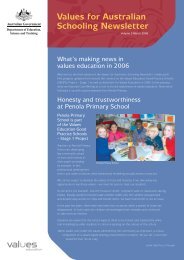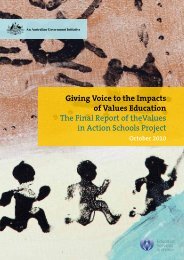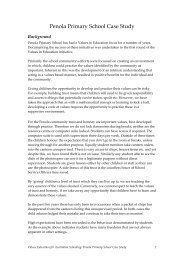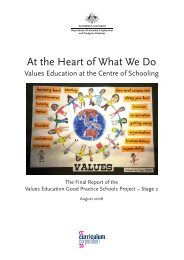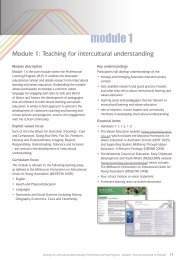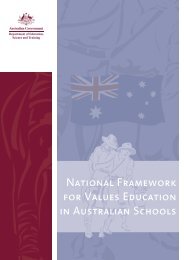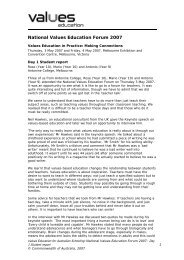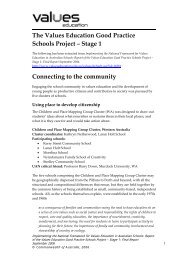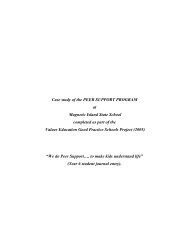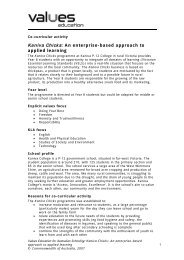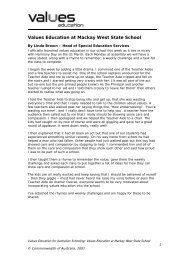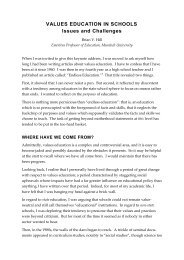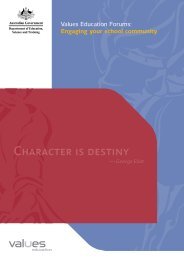Giving Voice to the Impacts of Values Education The Final Report of ...
Giving Voice to the Impacts of Values Education The Final Report of ...
Giving Voice to the Impacts of Values Education The Final Report of ...
You also want an ePaper? Increase the reach of your titles
YUMPU automatically turns print PDFs into web optimized ePapers that Google loves.
Evaluation <strong>of</strong> VASP projects<br />
This phase focused on collecting and consolidating<br />
project evaluation data. This included:<br />
• reports from Cluster Coordina<strong>to</strong>rs on <strong>the</strong>ir<br />
project activities and outcomes in two iterative<br />
reports with <strong>the</strong>ir final report being submitted <strong>to</strong><br />
Curriculum Corporation at <strong>the</strong> end <strong>of</strong><br />
Oc<strong>to</strong>ber 2009<br />
• submissions by clusters <strong>of</strong> key project artefacts,<br />
including such items as any locally based data,<br />
samples <strong>of</strong> units, surveys, teacher journals,<br />
student work samples and newsletters<br />
• completion by teachers and school-based<br />
participants <strong>of</strong> a post-project online survey (see<br />
below and Appendix 6) about <strong>the</strong>ir perceptions<br />
<strong>of</strong> values education<br />
• observational and reflection reports from cluster<br />
University Advisors<br />
• <strong>the</strong> collection <strong>of</strong> MSC s<strong>to</strong>ries from cohorts in<br />
each cluster.<br />
<strong>The</strong> collection <strong>of</strong> significant changes s<strong>to</strong>ries provided<br />
very direct participant input about <strong>the</strong> outcomes<br />
<strong>of</strong> <strong>the</strong> cluster projects. S<strong>to</strong>ries <strong>of</strong> change were<br />
collected from cohorts <strong>of</strong> parents, teachers and<br />
students. This s<strong>to</strong>ry collection was notable because<br />
<strong>the</strong> perspectives <strong>of</strong> <strong>the</strong>se three cohorts revealed<br />
<strong>the</strong> high level <strong>of</strong> importance each group ascribed<br />
<strong>to</strong> <strong>the</strong> values education approaches being enacted<br />
in classrooms and beyond. Parents’ responses were<br />
particularly powerful, as <strong>the</strong>y felt <strong>the</strong>y were involved<br />
in a mainstream curriculum discussion. This part <strong>of</strong><br />
<strong>the</strong> evaluation phase included:<br />
• collection and interpretation <strong>of</strong> s<strong>to</strong>ries <strong>of</strong> change<br />
in each cluster using <strong>the</strong> MSC technique<br />
• selection <strong>of</strong> s<strong>to</strong>ries by each cluster representing<br />
<strong>the</strong> most significant change in terms <strong>of</strong> <strong>the</strong>ir<br />
particular project<br />
• participation <strong>of</strong> students, parents and teachers<br />
from each cluster; Cluster Coordina<strong>to</strong>rs; Deputy<br />
Coordina<strong>to</strong>rs; University Advisors; State and<br />
Terri<strong>to</strong>ry <strong>Values</strong> <strong>Education</strong> Contact Officers;<br />
and personnel from Curriculum Corporation<br />
and DEEWR at <strong>the</strong> VASP Evaluation Summit<br />
in Melbourne, Oc<strong>to</strong>ber 2009<br />
• identification by <strong>the</strong>se participants <strong>of</strong><br />
<strong>the</strong> key <strong>the</strong>mes in <strong>the</strong> s<strong>to</strong>ries <strong>of</strong> change<br />
• selection by <strong>the</strong>se key participants <strong>of</strong> those<br />
s<strong>to</strong>ries that represent <strong>the</strong> most significant<br />
change in relation <strong>to</strong> values education<br />
approaches and practice.<br />
Most Significant Change technique<br />
<strong>The</strong> Most Significant Change technique (Davies &<br />
Dart 2005) 4 is a qualitative research method useful<br />
for moni<strong>to</strong>ring and evaluating <strong>the</strong> outcomes <strong>of</strong><br />
social research and action projects such as <strong>the</strong><br />
VASP. <strong>The</strong> MSC technique engages all participants<br />
in purposeful reflection on a project, in developing<br />
a shared understanding <strong>of</strong> its outcomes, and in<br />
presenting information about its impact. <strong>The</strong><br />
technique can be fur<strong>the</strong>r used <strong>to</strong> improve future<br />
planning and design, as well as build staff capacity<br />
<strong>to</strong> implement ongoing change.<br />
<strong>The</strong> decision <strong>to</strong> use <strong>the</strong> MSC technique arose from<br />
what was learnt about <strong>the</strong> nature <strong>of</strong> ‘evidence’<br />
about values education in Stages 1 and 2 <strong>of</strong> <strong>the</strong><br />
VEGPSP. In a review <strong>of</strong> <strong>the</strong> outcomes <strong>of</strong> <strong>the</strong> project<br />
methodologies <strong>of</strong> those two previous projects, ‘s<strong>to</strong>ry’<br />
emerged as a powerful aspect <strong>of</strong> <strong>the</strong> ‘evidence’<br />
ga<strong>the</strong>ring. In particular, teachers’ s<strong>to</strong>ries, as<br />
expressed in <strong>the</strong> Stage 2 case writing, provided some<br />
<strong>of</strong> <strong>the</strong> most compelling evidence <strong>of</strong> changed teacher<br />
practice. And, as <strong>the</strong> values conversation across <strong>the</strong><br />
nation grew – through conferences, monographs,<br />
commissioned quantitative research and expanded<br />
pr<strong>of</strong>essional development activity – it became clear<br />
that data on teachers’ perceptions about <strong>the</strong>ir role<br />
as values educa<strong>to</strong>rs was both <strong>of</strong> interest and a key<br />
determinant <strong>of</strong> successful project implementation.<br />
<strong>The</strong> MSC technique goes beyond merely capturing<br />
and documenting participants’ s<strong>to</strong>ries <strong>of</strong> impact,<br />
<strong>to</strong> <strong>of</strong>fering a means <strong>of</strong> engaging in effective<br />
dialogue. Designed <strong>to</strong> complement o<strong>the</strong>r forms <strong>of</strong><br />
data ga<strong>the</strong>ring, <strong>the</strong> MSC technique focuses on <strong>the</strong><br />
collection <strong>of</strong> s<strong>to</strong>ries <strong>of</strong> change, <strong>the</strong> discussion and<br />
4 For a comprehensive guide <strong>to</strong> <strong>the</strong> Most Significant Change<br />
technique, see Davies and Dart (2005).<br />
18 <strong>Giving</strong> <strong>Voice</strong> <strong>to</strong> <strong>the</strong> <strong>Impacts</strong> <strong>of</strong> <strong>Values</strong> <strong>Education</strong>: <strong>The</strong> <strong>Final</strong> <strong>Report</strong> <strong>of</strong> <strong>the</strong> <strong>Values</strong> in Action Schools Project



